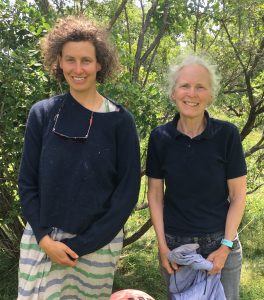
Dr. Robin Hadlock Seeley grew up in Maine and has dedicated her life as a scientist to the preservation of coastal ecosystems—in particular a form of seaweed called rockweed. Severine von Tscharner Fleming is a farmer and activist whose farm is on the Maine coast where rockweed is being harvested by the ton and shipped all over the world. What is the function of rockweed in ecosystems, and what would sustainable harvesting—as opposed to extractive mining—of rockweed look like?
For more information: seaweedcommons.org and mainerockweedcoalition.org
4’08 from snails to seaweed
5’32 how seaweed is the basis of the marine food web
6’28 role of rockweed in the ecosystem
7’48 rockweed as ecosystem engineer
8’06 rockweed as huge carbon absorber
8’41 rockweed and erosion
9’59 how to know how much seaweed to take
11’37 traditional and current roles of seaweed in farming
12’37 seaweed as global commodity
14’04 commodity rockweed uses, taking it out of communities
15’39 stronger regulations in local area than the rest of the state
16’18 rockweed good for commercial fisheries
17’29 existing regulations in Maine allow harvesters to take 75% of the rockweed
18’41 habitat degraded for some species
19’23 precautionary perspective
20’08 blue economy, techno-optimism, and an alternative blue commons perspective
21’40 thinking about oceans as a public trust
22’50 using a legal suit as a way to achieve the conservation of rockweed–but it’s hard to enforce
24’48 balancing commerce and sustainability
25’14 National Organic Standards Board made a good set of recommendations for sustainable harvest, but they haven’t been adopted
27’54 think about our impact on the environment “beyond the field’s edge”
28’29 seaweed used in restoration of ecosystems
30’42 questioning what you really want to take from a wild native ecosystem
32’44 the “seaweed is saving the world” idea leaves out the fact that seaweed is already saving the world
34’05 Rachel Carson called it an “underwater forest”
34’41 seaweedcommons.org
34’56 mainerockweedcoalition.org



Subscribe:
Apple Podcasts
Spotify